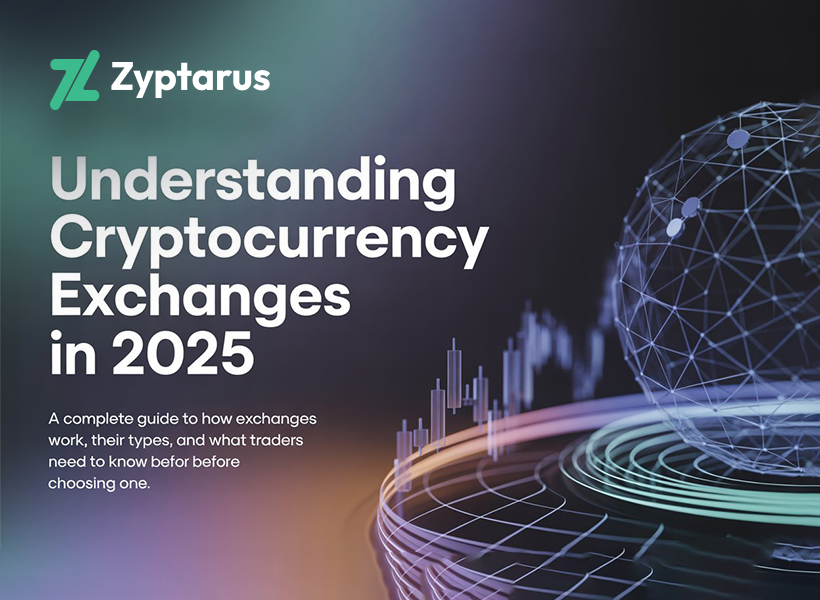Cryptocurrency exchanges are the backbone of the digital asset world. They serve as the gateways where people buy, sell, and trade crypto with ease. Without these platforms, entering the crypto market would be complicated for everyday users.
But how exactly do these exchanges work? What types of exchanges are out there? And what should you consider before choosing one? Let’s break it down.
What Is a Cryptocurrency Exchange?
A cryptocurrency exchange functions like a digital marketplace. It allows people to buy cryptocurrencies using fiat money or swap one digital asset for another. You can also sell your holdings and convert them back to cash.
Exchanges make the process simple for both beginners and professionals. Once you create an account, you can deposit funds, place buy/sell orders, and manage your portfolio in one place.
How Does a Crypto Exchange Operate?
Although different exchanges may offer unique features, the general process looks like this:
• Registration & Verification – Users sign up and verify their identity (KYC/AML) to ensure compliance and security.
• Deposit Funds – You can add money via bank transfers, credit cards, or deposit crypto directly.
• Trading Orders – Place buy/sell orders for the assets you want to trade.
• Order Matching – The exchange matches buyers with sellers at agreed prices.
• Transaction Settlement – The trade is executed, balances are updated, and you can withdraw your assets anytime.
This automated yet transparent process ensures smooth and fair trading for everyone.
Centralized vs. Decentralized Exchanges
When it comes to exchanges, there are two main categories:
• Centralized Exchanges (CEX): Operated by companies that provide trading infrastructure, customer support, and added features such as fiat deposits, leverage trading, and staking. Popular for their ease of use and liquidity.
• Decentralized Exchanges (DEX): Work on blockchain-based smart contracts without intermediaries. While they give full control to users, they may lack customer support, security safeguards, and regulatory protection.
Both models have their advantages. The choice depends on whether you value convenience and liquidity (CEX) or independence and privacy (DEX).
Understanding Exchange Fees
Every exchange applies certain fees. Here are the main ones to know:
• Trading Fees: Charged on buy/sell orders (usually a percentage of the trade).
• Deposit Fees: Often free or very low.
• Withdrawal Fees: Vary depending on the asset and network.
• Spread: The difference between buying and selling prices.
Being aware of these costs helps you trade smarter and avoid unnecessary expenses.
Security in Exchanges
Security is the most important factor in choosing an exchange. The best platforms use:
• Two-Factor Authentication (2FA)
• Cold wallet storage for most user funds
• Encryption & regulatory compliance
• Insurance and anti-fraud systems
Since hacks and scams have been part of crypto history, choosing a secure exchange is non-negotiable.
Why Beginners Should Care
If you’re just starting out, centralized exchanges are often the easiest way to enter crypto. They offer simple registration, fiat deposits, and user-friendly dashboards. Many also provide learning resources to help beginners grow their knowledge.
For those who value privacy and control, decentralized exchanges are worth exploring once you understand wallets and blockchain operations.
Crypto Exchange Regulations in 2025
Governments worldwide are enforcing stricter rules on exchanges, especially around KYC (Know Your Customer) and AML (Anti-Money Laundering) policies.
These regulations aim to protect investors and prevent misuse of crypto. Choosing a regulated exchange adds an extra layer of trust and legal protection.
What Makes an Exchange Stand Out in 2025?
In today’s market, the best exchanges usually offer:
• Transparent and competitive fees
• Wide selection of cryptocurrencies
• Fiat deposit/withdrawal options
• Staking and passive income opportunities
• Strong security protocols
• Beginner-friendly platforms with advanced features for pros
Cryptocurrency exchanges remain at the heart of the digital asset economy. Whether centralized or decentralized, these platforms provide the infrastructure needed for buying, selling, and growing investments.
If you’re new to crypto, start with research—understand how exchanges work, compare their fees, check their security standards, and choose the one that aligns with your goals.
At Zyptarus, our mission is to help traders and investors stay informed about the evolving crypto landscape. With the right exchange, you can unlock opportunities and trade with confidence in 2025 and beyond.
#cryptoexchanges,
#blockchaintechnology,
#cryptotrading,
#digitalassets,
#tradingguide,
#cryptomarket,
#blockchainfuture,
#tradingplatforms,
#cryptoeducation,
#cryptoinvesting,
#cryptonews,
#futureofcrypto,
#cryptotips
